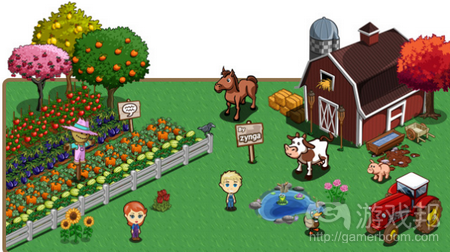阐述供社交游戏设计借鉴的压力处理原则
作者:Gabriel Lievano
我最近在《哈佛商业评论》的博客网站中读到篇有关如何将压力转换成有利条件的文章。文章称压力的好坏取决于个人心态。压力感受因个人应对紧张情景方式的不同而不同。
文章称想要让压力转变成有利条件,而非中间障碍,我们应遵循某些原则。文章描述的这些原则也适用社交游戏设计。下面我将逐一陈述,阐述他们同社交游戏的关系:
1. 理解忧虑本质
Menkes(游戏邦注:《Better Under Pressure: How Great Leaders Bring Out the Best in Themselves and Others》作者)表示,“人们之所以认为压力不健康通常是因为他们未理解忧虑本质,即感觉。”
意思是说压力是自发情感,因情境而生。压力是人类对逆境的自然反应,它促使个人更加警惕和留心自身行为,赋予整体体验更多重要性。这个原则其实适用所有游戏类型,但社交游戏尤其突出,其赋予体验过程更多重要性。它们告诉玩家 如何变得更好,如何通过完成简单任务取得更大成就,这些任务通常只需耗费少量时间和资源。玩家对这些内容了然于心,虽然他们或许没有意识到。玩家需持续面对些小压力,这些压力源自他们每天需及时完成和执行的游戏活动。虽然他们并不清楚压力只是种感觉,但他们知道压力只在体验游戏过程中产生。他们能够控制这些压力,对其心中有数,并且深信自己能够应对。
然而这对社交游戏来说并不够。显然社交游戏不会一直利用这些压力。我玩过各种不同类型的社交游戏,最好的是那种只需玩家给予极少关注的体验。关注度是个必备要素,但程度越强烈,疲惫感就越突出。
2. 压力调整
他表示,“Achor的研究表明你对待压力的态度将决定其产生的影响。我们的大脑在消极状态的运作效果比消极、中间或紧张状态好(游戏邦注:Achor是积极心理学专家,同时是Good Think, Inc.的创始人)。
跳至游戏领域,这意味着压力不应是个邪恶元素。很多游戏类型都有效利用该原则,因为它们常告诉玩家要如何应对大量压力。游戏的妙处是玩家不仅能学会如何处理压力,还能根据自己的欲望和忍耐度控制压力程度。但社交游戏有个小弊端,就是计时器一旦启动,就无法倒退。玩家一旦开始某款社交游戏就不得不跟进游戏流程。他们享有的唯一控制权就是决定继续还是退出(就会丢失进度)。
压力调整其实在社交游戏当中非常罕见。多数社交游戏的目标都是让玩家进入无限循环的游戏周期。将循环机制换做等级进程(游戏邦注:其中若玩家完成某个“循环”就能够稍加休息,或者游戏变更机制)是否会更理想呢?
3. 瞄准控制范围
Achor在其书《The Happiness Advantage》中谈到一个处理问题或特殊情况的方式。罗列能够控制的元素,将它们放置至某个圆圈当中,然后将你不能控制的写入另一个圆圈。
这对社交游戏设计师而言是个很好的策略,对其他游戏设计师而言亦是如此。权衡玩家能够控制和无法控制的元素至关重要。采取此策略的主要目的是平衡玩家压力程度,获悉其应对方式。若所有元素都在控制之中,那么游戏就会失去挑战性,变得枯燥乏味。
4. 创建网络支持
“获悉能向某人求助作用很大。”
这对社交游戏而言尤其如此。其实社交游戏在设计时应当遵守该原则。玩家不断承受压力,然后通过伙伴玩家的协助支持解决,这是很好的游戏设计。压力随后分化成两大方向:1)在自身虚拟世界中发展 2)寻求友好支持。第二个方向的优点是其非强制性,玩家可以在危难时刻选择此帮助。
5. 提供压力应对经验
我曾读到篇关于一次机会视频游戏的文章。他们采取的策略是让玩家在参与至“真正”游戏前进行系列练习。玩家只有进行足够训练,确保能够获得成功,方能进入真正的游戏当中。若其在真正游戏中失败,就再没有机会。
具有失败可能的游戏是好体验。多数社交游戏不会让玩家失败,只是让他们知道若你没有给予足够关注,会白白浪费时间。我认为社交游戏是有失败可能的,这个机制应该得到鼓励(游戏邦注:应该像鼓励训练一样鼓励该模式)。若社交游戏都变成持久体验,甚至会长达若干天,那么失去所有进程将会令人倍感沮丧。但如果进行足够训练,且玩家确信决定的正确性,这将带给玩家信心和安全感。(本文为游戏邦/gamerboom.com编译,如需转载请联系:游戏邦)
Stress as a feature in Social Gaming
by Gabriel Lievano
I recently read an article in the Harvard Business Review Blog Network about Turning Stress into an Asset by Amy Gallo. This article claims that stress can be a good or bad thing depending on how the stressed individual takes it. Stress can be taken differently depending on how the individual interacts with the stressing situation.
The article states some principles that should be followed in order to turn stress into an asset instead of letting it become an obstacle in the way. The thing about this article and social games is that the principles described in the article are compatible with design principles that should be taken into account when creating a social game. I’ll mention the principles described in the article and explain how they relate to social gaming:
1. Recognize worry for what it is
“When you hear about stress being unhealthy it is so often because people aren’t getting to a place where they are seeing worry for what it is: a feeling,” says Menkes (author of Better Under Pressure: How Great Leaders Bring Out the Best in Themselves and Others).
What this means is that stress is something that is spontaneous and comes when the situation calls for it. Stress is actually a natural response to adversities and it helps individuals be more alert and carefull about their actions, giving more importance to the whole experience. This principle actually applies to most of the game genres, however social gaming is crucial about stress and giving importance to moments. They suggest users ways to become better, grow and achieve greater things by doing simple stuff, hopefully stuff that requires a small amount of time and resources. This is something that is clear to players even if they are not conscious about it. Users are thrown with small stress permanently, a stress that is caused due to their responsibility of having to get in the game and perform some actions on time every day. Even though they aren’t clear about how stress is something that is just a feeling, they know that it lasts only while they play the game. They have control of it, they know it and are sure about it.
However, this is not enough for Social Gaming. It is precise that social games do not use this kind of stress permanently. I have experienced playing differente social games, and the best are those which require the least amount of attention from the user. Attention is a must requirement, but the most intense it is the most tiring it gets.
2. Then, reframe the stress
“Achor’s research shows that how you view stress determines its effect on you. “Our brains work much better at positive than at negative, neutral, or stressed,” he says.” (Achor is an expert in positive psychology and founder of Good Think, Inc.).
Translating into gaming, this means stress shouldn’t be a vicious thing. Most game genres are perfect about exploiting this principle since they teach players how to handle great amounts of stress most of the time. Games are perfect because users not only learn to handle stress but they can also control the amount taken according to their desires and tolerance. However Social Gaming has a small disadvantage and it is that once the timer starts, there’s (in most of the cases) no turning back. Users start playing a social game and they just have to go on with the game’s schedule. The only control they have is to keep playing or stop (and lose their progress).
This stress reframing is actually very rare in social games. Most social games are designed to put the user in a game cycle that repeats itself infinitely. Wouldn’t it be great if instead of making it a cycle creating some kind of progressive ladder where once the player finishes a “cycle” he is given with a rest and maybe some changes in the game mechanics?
3. Focus on what you control
In Achor’s book, The Happiness Advantage, he describes a way to handling problems or situtations. Put the things that can be controlled and write them down in a circle and those that you can’t control and write them down in another.
This is specially a good exercise for social game designers, and to any game designer of any genre. It is crucial to think about those things that the player will be able to control and those which he won’t. The main idea when doing this is to create a perfect balance in the amount of stress that the player will handle and how he will be able to approach it. If things become very controllable there wouldn’t be much of a challenge and the game would become rather boring.
4. Create a network support
“Knowing that you have somebody to turn to can help a lot.”
This is specially true for social games. In fact social gaming should turn to this principle in most of the design decisions taken. It is great if you have a constant input of stress and rely on collaborative support with fellow gamers to help you deal with it. The stress would then split on two objectives, 1) evolving in your own virtual world and 2) finding friendly support. The good thing about the second objective is that it wouldn’t be mandatory, is something you can turn to when in need.
5. Get some stress-handling experience
There is something I saw from an article about one-live videogames. What they do is that they let you practice a lot before attending the “real” game. That way you don’t go into the real game until you practice enough to let you be sure you will succeed in the the real game… and then if you lose in the real game you lose forever.
Is good to have an experience where losing is posible. Most social games won’t let you lose, they just make you know you wasted some time if you don’t pay enough attention to the game. I believe losing is posible in social gaming and it should also be encouraged. It should be encouraged in the same measure that practice should be encouraged. After all social games are long experiences, they last several days and it could be really frustrating to just lose all the progress. However, if there is enough practice and the player knows for sure that his decisions are correct, it will give the player healthy confidence and security.(Source:gamasutra)
上一篇:阐述社交游戏的运营和成本优势
下一篇:如何制作一款令人上瘾的社交游戏?









































 闽公网安备35020302001549号
闽公网安备35020302001549号